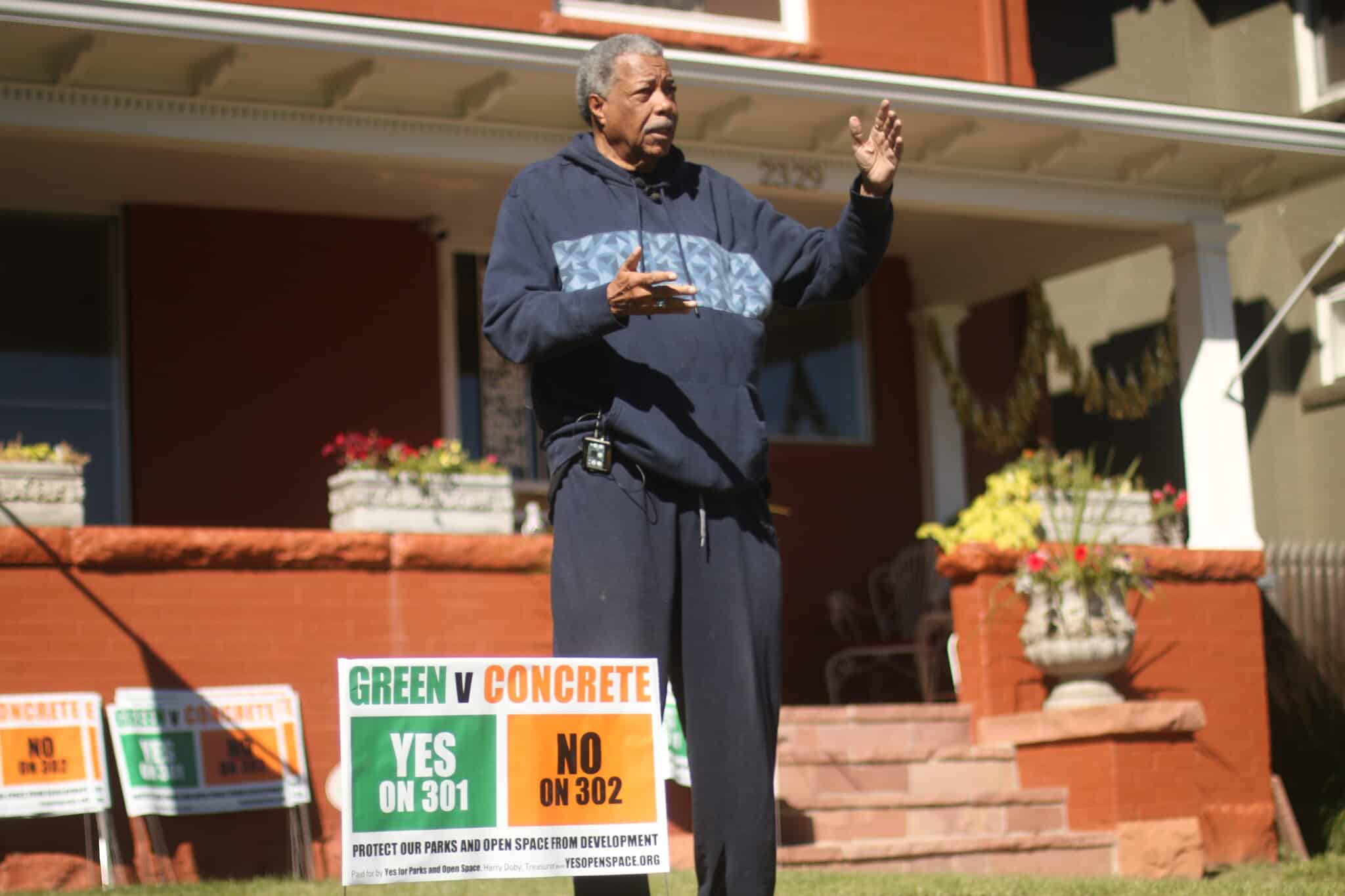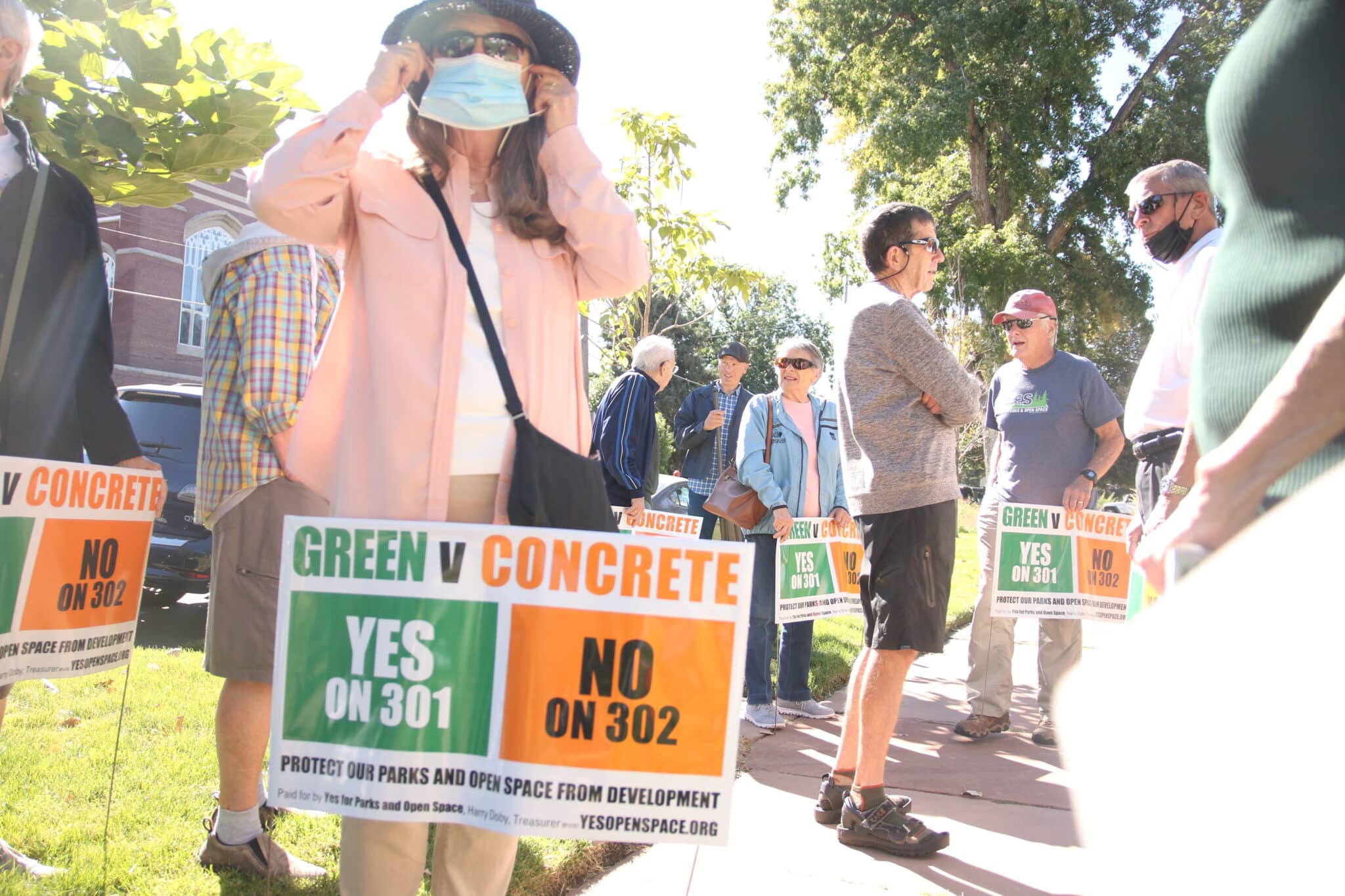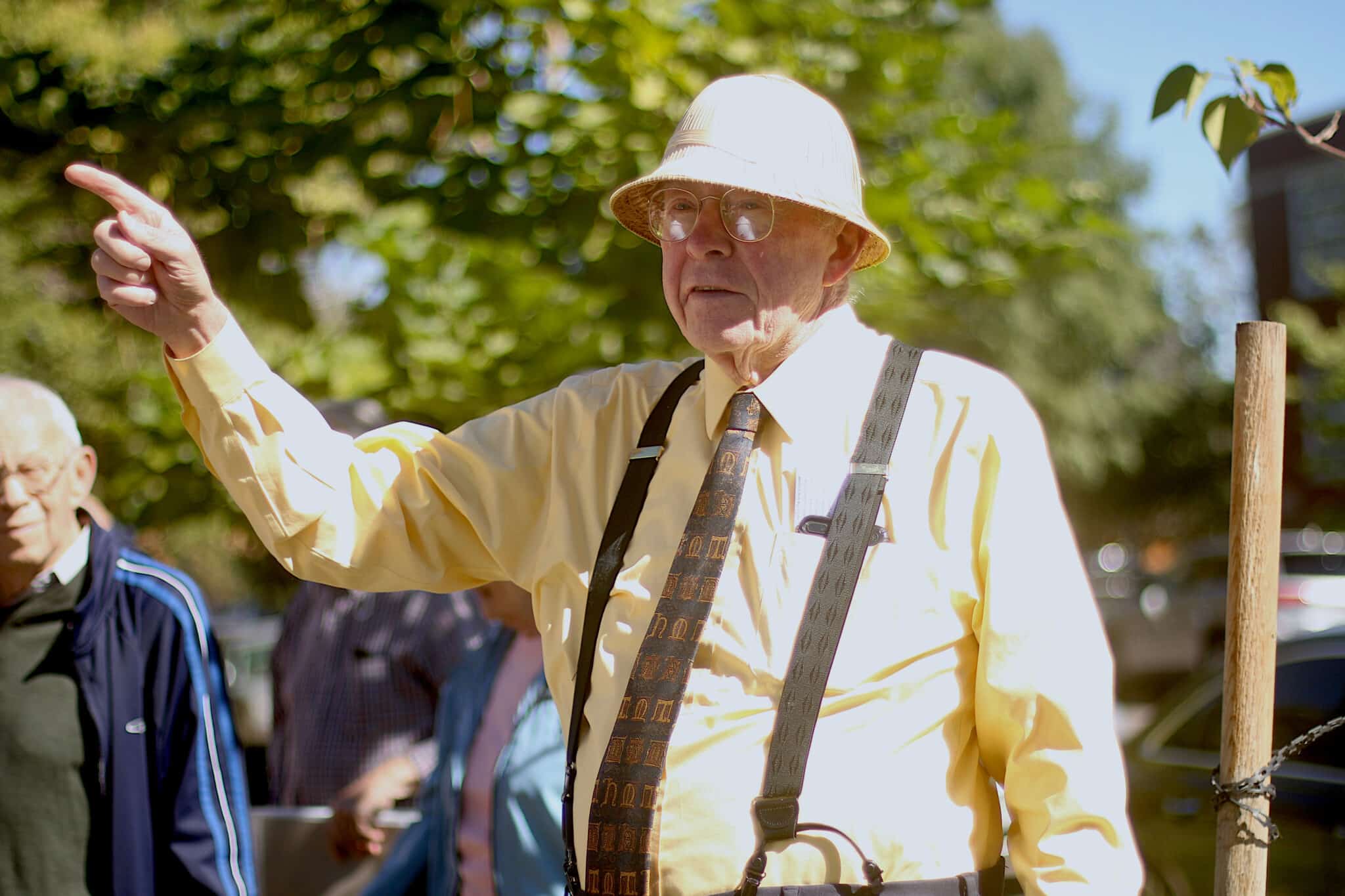
Former Denver Mayor Wellington Webb speaks Wednesday to a group of supporters of Initiative 301, which seeks to preserve Park Hill Golf Club as open space. (Eric Heinz photos)
Supporters of competing ballot initiatives over the future of the former Park Hill Golf Club property have begun their November campaigns.
Standing in front of his home on Wednesday, former Mayor Wellington Webb distributed a fleet of yard signs in support of Initiative 301, which seeks to preserve the shuttered golf course as open space. It would require a city vote on canceling a conservation easement, essentially adding an additional hurdle to development of the course.
An opposing ballot question, Initiative 302, would essentially exempt the Park Hill property if Initiative 301 passes, nullifying the main goal of the first initiative.
Webb said the plans by the landowners would not serve the poorer population that lives in the area.
“They want to develop; I want to develop. But we want to develop parks and open space,” Webb said. “They’ve (the developers) got two choices. They can either make it a gentrification neighborhood, or they can make it a ghetto neighborhood with housing that only is going to work for people that can afford it.”
Initiative 301 is known as Yes for Park and Open Space and Initiative 302 is known as Conservation Easement.
The way the ballot measures are written, nothing would change if both pass. If Initiative 301 passes and 302 does not, a vote of Denver residents would be required for most development on park land within the city.
The battle over the former golf course revolves around a conservation easement established in 1997 between the former golf course owners and the city, which states the land will be kept as a golf course.

People in favor of Initiative 301 gather Wednesday in front of Webb’s home to kick off the campaign.
In July 2019, months after the golf course ceased operating, the course was sold to Glendale-based Westside Investment Partners for $24 million. Through an agreement that same year, the city, wanting to keep control of how the land is used, agreed to pay Westside $6 million in exchange for a new but essentially similar easement.
“Initiative 301 is disingenuously crafted to apply to one piece of property in the city that is in a neighborhood that is majority non-white and has incomes 30 percent lower than city averages,” said Kenneth Ho, a principal at Westside. “It gives veto power to an electorate that does not understand the local community issues and doesn’t represent them.”
Ho said his group is committed to developing a project that benefits the surrounding neighborhood.
“We will be working with the local community and the city for years on any kind of project, and nothing is guaranteed,” Ho said. “We just believe the community around the golf course deserves to have their voices elevated in the discussion around the future of this private, defunct golf course. Initiative 302 … protects local choices and local voices.”
Webb said the Yes for Parks and Open Space campaign will go door-to-door to get support from people who live near the old golf course and throughout the city, as all Denver residents will have the chance to vote on it.
Initiative 301 campaign strategist Sheila MacDonald told BusinessDen the plans are to distribute 3,000 to 5,000 yard signs in addition to the ones already placed throughout the city, and Webb said all people involved with the campaign are volunteers.
“This is about green versus concrete,” Webb said. “This is about open space versus big money.”
The committee Yes for Parks and Open Space has raised about $89,000 for its campaign, close to $180,000 less than opposing committee Empower Northeast Denver. The parks and open space campaign has spent about $33,000, while the empower campaign has spent about $10,000, according to the latest required financial disclosures. Westside also put $268,000 toward Empower Northeast Denver as an in-kind donation for signature gathering, the documents state.
Ho said most of the campaigning by proponents of Initiative 302, which is financially backed by Westside, has been through community meetings.
An Initiative 302 proponent and third-generation Northeast Park Hill resident, Samie Burnett said the area has “real needs” for development.
“I have experienced firsthand the pattern of divestment and displacement of long-term residents that has dramatically changed this neighborhood,” Burnett said via email. “We should have the right to determine how to use this property to meet those needs just like any other community. Initiative 301 is a direct attempt by people that don’t live here to take away our voice.”
Jay Rust of Cheesman Park, who attended the Wednesday morning Yes for Park and Open Space event, said Northeast Park Hill has opportunities to redevelop surrounding properties instead of building on open space.
“You don’t need to take this huge parcel of land from the city,” Rust said.
A lawsuit was filed in June by the organization Save Open Space Denver, a separate organization from Yes for Parks and Open Space but one that has the same goals, against the city of Denver and Westside to stop them from organizing community meetings over potential development because the easement is still in place. That case is ongoing.
The election, which includes several ballot measures and initiatives, is Nov. 2.
Editor’s Note: The second and third paragraph of this story have been updated to clarify what Initiative 302 would do. Reference to an in-kind donation by Westside to Empower Northeast Denver has also been added.

Former Denver Mayor Wellington Webb speaks Wednesday to a group of supporters of Initiative 301, which seeks to preserve Park Hill Golf Club as open space. (Eric Heinz photos)
Supporters of competing ballot initiatives over the future of the former Park Hill Golf Club property have begun their November campaigns.
Standing in front of his home on Wednesday, former Mayor Wellington Webb distributed a fleet of yard signs in support of Initiative 301, which seeks to preserve the shuttered golf course as open space. It would require a city vote on canceling a conservation easement, essentially adding an additional hurdle to development of the course.
An opposing ballot question, Initiative 302, would essentially exempt the Park Hill property if Initiative 301 passes, nullifying the main goal of the first initiative.
Webb said the plans by the landowners would not serve the poorer population that lives in the area.
“They want to develop; I want to develop. But we want to develop parks and open space,” Webb said. “They’ve (the developers) got two choices. They can either make it a gentrification neighborhood, or they can make it a ghetto neighborhood with housing that only is going to work for people that can afford it.”
Initiative 301 is known as Yes for Park and Open Space and Initiative 302 is known as Conservation Easement.
The way the ballot measures are written, nothing would change if both pass. If Initiative 301 passes and 302 does not, a vote of Denver residents would be required for most development on park land within the city.
The battle over the former golf course revolves around a conservation easement established in 1997 between the former golf course owners and the city, which states the land will be kept as a golf course.

People in favor of Initiative 301 gather Wednesday in front of Webb’s home to kick off the campaign.
In July 2019, months after the golf course ceased operating, the course was sold to Glendale-based Westside Investment Partners for $24 million. Through an agreement that same year, the city, wanting to keep control of how the land is used, agreed to pay Westside $6 million in exchange for a new but essentially similar easement.
“Initiative 301 is disingenuously crafted to apply to one piece of property in the city that is in a neighborhood that is majority non-white and has incomes 30 percent lower than city averages,” said Kenneth Ho, a principal at Westside. “It gives veto power to an electorate that does not understand the local community issues and doesn’t represent them.”
Ho said his group is committed to developing a project that benefits the surrounding neighborhood.
“We will be working with the local community and the city for years on any kind of project, and nothing is guaranteed,” Ho said. “We just believe the community around the golf course deserves to have their voices elevated in the discussion around the future of this private, defunct golf course. Initiative 302 … protects local choices and local voices.”
Webb said the Yes for Parks and Open Space campaign will go door-to-door to get support from people who live near the old golf course and throughout the city, as all Denver residents will have the chance to vote on it.
Initiative 301 campaign strategist Sheila MacDonald told BusinessDen the plans are to distribute 3,000 to 5,000 yard signs in addition to the ones already placed throughout the city, and Webb said all people involved with the campaign are volunteers.
“This is about green versus concrete,” Webb said. “This is about open space versus big money.”
The committee Yes for Parks and Open Space has raised about $89,000 for its campaign, close to $180,000 less than opposing committee Empower Northeast Denver. The parks and open space campaign has spent about $33,000, while the empower campaign has spent about $10,000, according to the latest required financial disclosures. Westside also put $268,000 toward Empower Northeast Denver as an in-kind donation for signature gathering, the documents state.
Ho said most of the campaigning by proponents of Initiative 302, which is financially backed by Westside, has been through community meetings.
An Initiative 302 proponent and third-generation Northeast Park Hill resident, Samie Burnett said the area has “real needs” for development.
“I have experienced firsthand the pattern of divestment and displacement of long-term residents that has dramatically changed this neighborhood,” Burnett said via email. “We should have the right to determine how to use this property to meet those needs just like any other community. Initiative 301 is a direct attempt by people that don’t live here to take away our voice.”
Jay Rust of Cheesman Park, who attended the Wednesday morning Yes for Park and Open Space event, said Northeast Park Hill has opportunities to redevelop surrounding properties instead of building on open space.
“You don’t need to take this huge parcel of land from the city,” Rust said.
A lawsuit was filed in June by the organization Save Open Space Denver, a separate organization from Yes for Parks and Open Space but one that has the same goals, against the city of Denver and Westside to stop them from organizing community meetings over potential development because the easement is still in place. That case is ongoing.
The election, which includes several ballot measures and initiatives, is Nov. 2.
Editor’s Note: The second and third paragraph of this story have been updated to clarify what Initiative 302 would do. Reference to an in-kind donation by Westside to Empower Northeast Denver has also been added.

